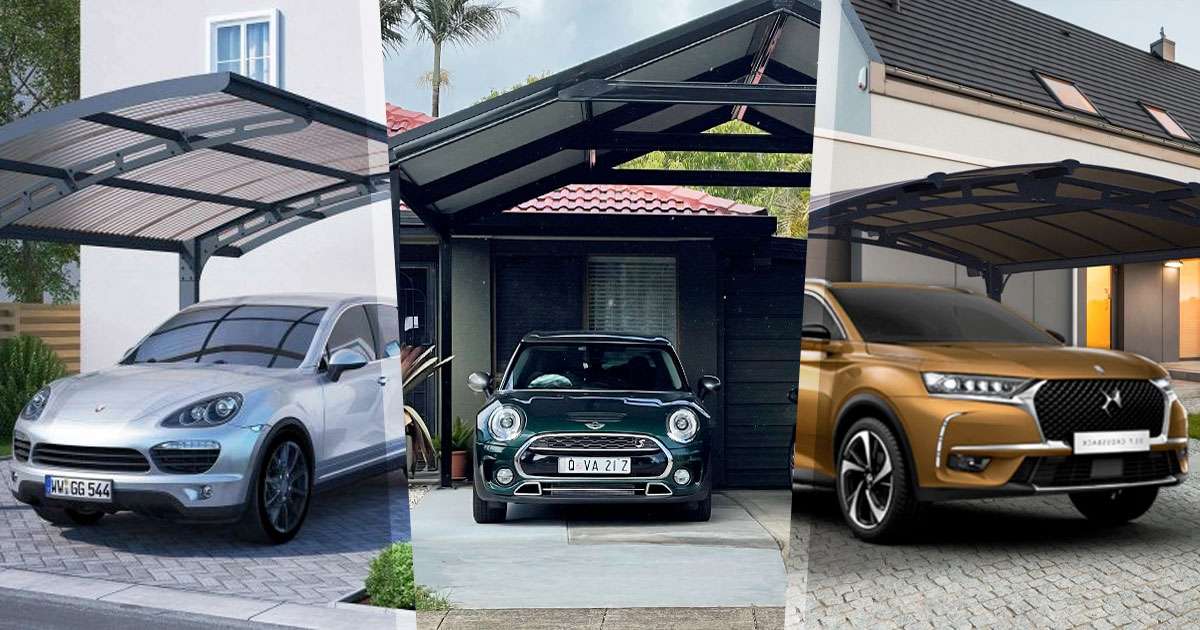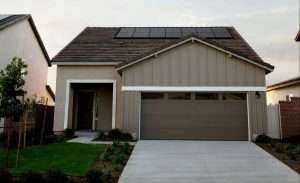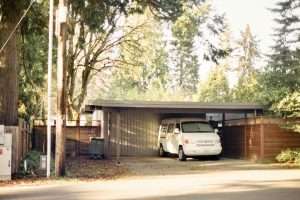Understanding the Use & Benefit of A Carport

In the realm of vehicle protection, the term “carport” may be familiar, but what exactly is a carport, and is it something worth considering? This article aims to shed light on the definition of a carport, how it differs from a garage, and whether investing in one is a prudent choice.
What is a carport?
A carport is a covered structure designed to provide shelter for vehicles, typically cars. Unlike a garage, a carport is characterized by its open sides, offering overhead protection without fully enclosing the space. The primary purpose of a carport is to shield vehicles from the elements, including rain, sun, and snow.
How does it differ from a garage?
The distinction between a carport and a garage extends beyond their structural dissimilarities, significantly influencing their functionality, aesthetics, and overall impact on property use.

Structural components
- Garage: A garage is a fully enclosed structure, that provides a secure and sheltered space for vehicles. It comprises four walls, a roof, and a garage door, allowing complete isolation from external elements.
- Carport: In contrast, a carport maintains an open-sided design, typically featuring a roof supported by pillars. The absence of enclosed walls distinguishes it from a garage, providing a more permeable structure.
Ventilation and accessibility
- Garage: Due to its enclosed nature, a garage offers superior protection against various weather conditions. However, limited ventilation may result in stagnant air, potential moisture buildup, and higher temperatures during hot seasons.
- Carport: Carports, with their open design, facilitate better ventilation, preventing the buildup of humidity and offering a cooler environment. The open sides also contribute to easier accessibility and visibility of the parked vehicle.
Versatility of use
- Garage: Garages, being fully enclosed, provide a multifunctional space beyond vehicle storage. They can be converted into workshops, home gyms, or additional living spaces, offering a private and secure extension to the home.
- Carport: While primarily designed for vehicle protection, carports boast versatility. Their open structure allows for outdoor gatherings, workshops, or covered play areas. The adaptable design enhances the overall utility of the covered space.
Aesthetics and integration
- Garage: Garages, with their enclosed design, may have a more substantial visual impact on a property. Integrating them seamlessly with the home’s architecture can enhance overall aesthetics but may pose challenges in certain settings.
- Carport: Carports, with their open and minimalist design, can complement a variety of architectural styles. They offer a lighter visual footprint, providing a harmonious blend with the surrounding environment.
Which is better to have?
The decision between a carport and a garage is not a one-size-fits-all scenario but requires a thoughtful evaluation of specific factors.
Considerations
1. Budget constraints
- Carport: Generally more cost-effective to build, making it a practical choice for those on a tighter budget.
- Garage: Involves higher construction costs, including materials, doors, and potential electrical installations.
2. Space utilization
- Carport: Ideal for those prioritizing open spaces and multifunctional use of the covered area.
- Garage: Suited for homeowners seeking enclosed, secure space for vehicles and additional storage.
3. Property value enhancement
- Carport: This may contribute to property value but might not have as significant an impact as a well-designed garage.
- Garage: Has the potential to increase property value, especially if seamlessly integrated into the home’s design.
4. Security needs
- Carport: Offers less security due to the open sides, making it more accessible to potential theft or vandalism.
- Garage: Provides a higher level of security with complete enclosure, deterring unauthorized access.
Do you need a carport?
The decision to invest in a carport, especially when you already have a garage, requires a nuanced consideration of the additional benefits it brings to your property. Exploring both the advantages and drawbacks helps in determining the relevance of having a carport alongside an existing garage.

Pros of carports
- Cost-Effective Solution: Carports present a budget-friendly alternative to garages, making them an economical choice for homeowners looking for effective vehicle protection without hefty construction costs.
- Quick Construction: The simplicity in the design and structure of carports facilitates rapid construction. This swift implementation is advantageous for those seeking a timely solution for vehicle coverage.
- Versatility in Design: Carports offer homeowners a range of design options, from materials to styles. This flexibility allows for customization that complements the existing property aesthetics, enhancing the overall visual appeal.
- Additional Storage Space: Beyond safeguarding vehicles, carports serve as versatile spaces that can be utilized for various purposes, such as additional storage or outdoor activities. This multifunctionality adds to the overall value of having a carport.
- Minimal Approval Requirements: Obtaining approval for a carport from local councils is often a smoother process compared to the more stringent regulations associated with garages. The simplified approval process adds to the convenience of opting for a carport.
Cons of carports
- Limited Security: The open-sided nature of carports poses a security challenge. As they lack complete enclosure, vehicles, and stored belongings are more visible and accessible, potentially making them targets for theft or vandalism.
- Reduced Protection: While effective against sun and rain, carports may provide limited protection during severe weather conditions such as hailstorms or heavy snow. The partial openness exposes vehicles to elements to a certain extent.
- Limited Property Value Boost: The impact of a carport on enhancing property resale value may be less significant compared to a well-constructed garage. Potential homebuyers might perceive garages as more valuable additions to a property.
- Shorter Lifespan: Carports, due to their simpler structure, may have a shorter lifespan compared to garages. This implies a potential need for replacements or renovations sooner, impacting long-term durability.
Carport is something to be considered
Whether a carport is worth getting depends on individual needs and circumstances. For those without a garage, a carport offers a cost-effective and practical solution for protecting vehicles and creating additional covered space. However, it’s crucial to acknowledge the trade-offs, such as reduced security and limited protection during severe weather.
Considering the versatility, quick construction, and budget-friendly nature of carports, they emerge as a viable option for homeowners seeking a straightforward solution for vehicle protection and more. While not a substitute for the comprehensive security provided by a garage, carports add value in their own right.
In the end, the decision to invest in a carport hinges on balancing priorities, budget constraints, and the specific requirements of each homeowner. As the search for effective vehicle protection continues, a well-designed and strategically placed carport can indeed be a valuable addition to a property, contributing to both functionality and curb appeal.

